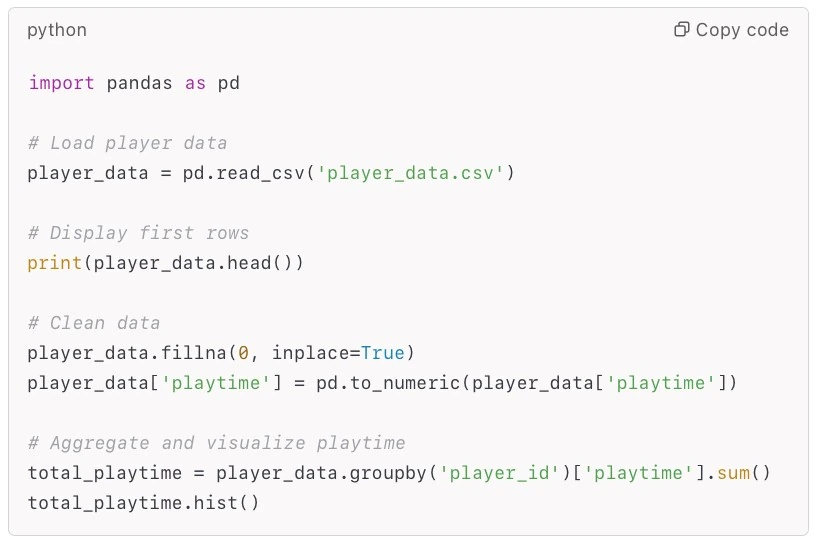Data Analytics
Leveraging Pandas for Data Analytics in the Gaming Industry
Discover how Pandas, a powerful Python library, is revolutionizing data analytics in the gaming industry. Learn how game studios can leverage data to enhance player experiences, optimize game performance, and drive growth. Join us at Audienze Labs as we dive into advanced techniques and practical applications that are transforming modern game development.
December 16, 2024

Introduction: The Role of Data Analytics
Data analytics has become a cornerstone in the modern gaming industry. By leveraging vast amounts of data, gaming studios and developers can make informed decisions, enhance player experiences, and drive revenue growth. The ability to analyze and interpret data allows for optimization in various aspects of game development, from player engagement to monetization strategies.
What is Pandas and How is it Used in Data Analytics?
Pandas is an open-source data analysis and manipulation library for Python, created by Wes McKinney in 2008 to simplify working with structured data. Its name is derived from “Panel Data,” a term used in econometrics, and it reflects the library’s focus on handling and analyzing data tables in a flexible and efficient way. Built on top of NumPy, Pandas introduces data structures like Series (one-dimensional arrays) and DataFrames (two-dimensional tables), which make it easy for users to organize, filter, and manipulate large datasets efficiently (McKinney, 2012).
In data analytics, Pandas has become a cornerstone library for data cleaning, transformation, and exploratory analysis. With Pandas, analysts can quickly load data from various file formats (such as CSV, Excel, and SQL databases) and perform complex data operations like merging, grouping, and pivoting. Its intuitive syntax allows for simple yet powerful data wrangling, including handling missing values, filtering data based on conditions, and reshaping datasets, which can streamline the entire data preprocessing stage (McKinney, 2012).
Key Features of Pandas
- Data Structures: Series: A one-dimensional labeled array capable of holding any data type. It is similar to a column in a spreadsheet.DataFrame: A two-dimensional labeled data structure with columns that can hold different data types. It is akin to a table in a database or a spreadsheet.
- Data Manipulation: Handling Missing Data: Pandas provides functions to detect and fill missing values, which is essential for maintaining data integrity.Filtering and Indexing: Users can filter data based on conditions and perform operations on subsets of data.Data Transformation: Functions for merging, grouping, pivoting, and reshaping data make it easier to prepare data for analysis.
- Data Input/Output: Reading/Writing Data: Pandas supports reading data from and writing data to a variety of formats, including CSV, Excel, SQL, and JSON.
The Power of Pandas in Data Analytics
Pandas is indispensable in data analytics, particularly in the gaming industry, due to its flexibility and ease of use:
- 1. Data Cleaning and Preprocessing Raw gaming data often contains inconsistencies, missing values, and duplicates. Pandas enables analysts to clean and preprocess data with functions to handle these issues, ensuring high-quality data for analysis.
- 2. Data Transformation and Integration Gaming data from various sources—player profiles, session logs, and databases—can be integrated and transformed using Pandas, which supports diverse file formats. This facilitates a cohesive dataset for analysis, creating a unified view of player behavior.
- 3. Exploratory Data Analysis (EDA) Before applying complex algorithms, understanding the dataset is essential. Pandas simplifies EDA by providing descriptive statistics and data visualizations, helping studios identify trends, player demographics, and popular in-game features.
- 4. Data Aggregation and Grouping Aggregating and grouping data is straightforward with Pandas, allowing developers to analyze specific player segments, behaviors, and in-game actions. Metrics like average session time or purchase frequency reveal patterns that guide decision-making.
- 5. Time Series Analysis Gaming metrics often fluctuate over time. Pandas supports time series data analysis, enabling studios to identify trends and forecast player engagement, supporting optimal scheduling for events and player retention strategies.
Pros and Challenges of Using Pandas
Pros:
- User-Friendly: Pandas offers an intuitive syntax that makes data manipulation straightforward and accessible.
- Performance: Built on top of NumPy, Pandas ensures high performance for data operations.
- Versatility: Pandas supports a wide range of file formats and data manipulation techniques, making it versatile for various applications.
- Community and Documentation: Pandas has extensive documentation and a large user community, providing ample support and resources.
Challenges:
- Memory Consumption: Pandas can be memory-intensive, particularly with very large datasets.
- Performance with Large Datasets: While Pandas is efficient, it may struggle with performance issues when handling extremely large datasets.
- Learning Curve: For users new to Python and data analysis, there may be a learning curve to fully leverage Pandas' capabilities.
The Role of Data Analytics in Gaming
In a rapidly evolving gaming industry, data analytics is a powerful asset that enables studios to gain insights into player behavior, optimize gameplay experiences, and drive growth. Leveraging tools like Pandas, a Python library tailored for data manipulation, studios can harness the full potential of their data to make informed decisions, enhance engagement, and create memorable gaming experiences.
Advanced Applications of Pandas in the Gaming Industry
Pandas serves a pivotal role in multiple areas of gaming analytics:
- 1. A/B Testing for Feature Rollouts With Pandas, studios can conduct A/B testing by analyzing segmented data on player metrics, engagement, and retention, allowing for refined feature updates that enhance the gaming experience.
- 2. Sentiment Analysis from User Feedback Pandas, in combination with text-processing libraries, can analyze player feedback from reviews and in-game chats, providing insights that guide improvements in game features and player satisfaction.
- 3. Cheat Detection and Anti-Fraud Measures Anomaly detection through Pandas helps identify unusual behaviors, like rapid level progression or transaction spikes, to prevent cheating and ensure fair gameplay.
- 4. Dynamic Difficulty Adjustment By analyzing player performance data, Pandas facilitates dynamic difficulty adjustments, keeping players of varying skill levels engaged without frustration, leading to improved retention.
- 5. Event and Promotion Optimization Historical data on player activity helps studios time in-game events and promotions for maximum engagement. Pandas enables analysis of peak activity periods to boost participation in events and player satisfaction.
Practical Example: Analyzing Player Behavior
Let's consider a practical example of how Pandas can be used to analyze player behavior data. Suppose we have a dataset containing information about players, their playtime, and their in-app purchases.
By examining player data, studios can identify patterns such as high engagement levels in specific game sections, revealing areas to optimize or adjust to improve player satisfaction and retention.

Conclusion
The gaming industry is increasingly leveraging data analytics to craft more immersive and engaging experiences. Pandas, as part of Python’s extensive ecosystem, empowers studios to clean, analyze, and transform data, making it a fundamental tool in modern game development. From understanding player behavior to optimizing in-game monetization, Pandas enables studios to make data-driven decisions that enhance gameplay, improve retention, and drive revenue.
At Audienze Labs, we specialize in leveraging data analytics to support gaming studios and developers in maximizing player engagement and satisfaction. Our experts harness Python’s powerful libraries, including Pandas, to provide actionable insights that guide game design, player retention, and monetization strategies. If you're ready to elevate your game with data-driven insights, contact Audienze Labs today to see how our comprehensive analytics services can enhance your gaming brand and boost player loyalty.